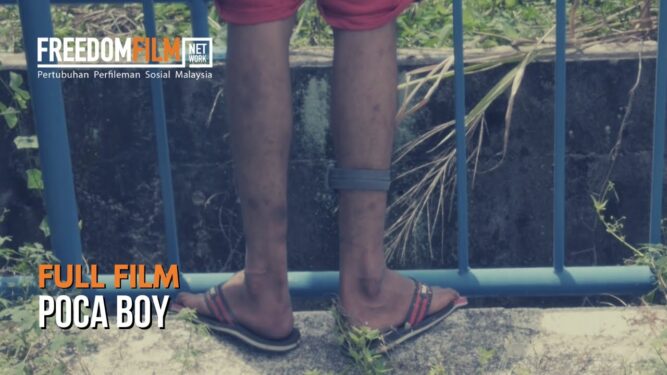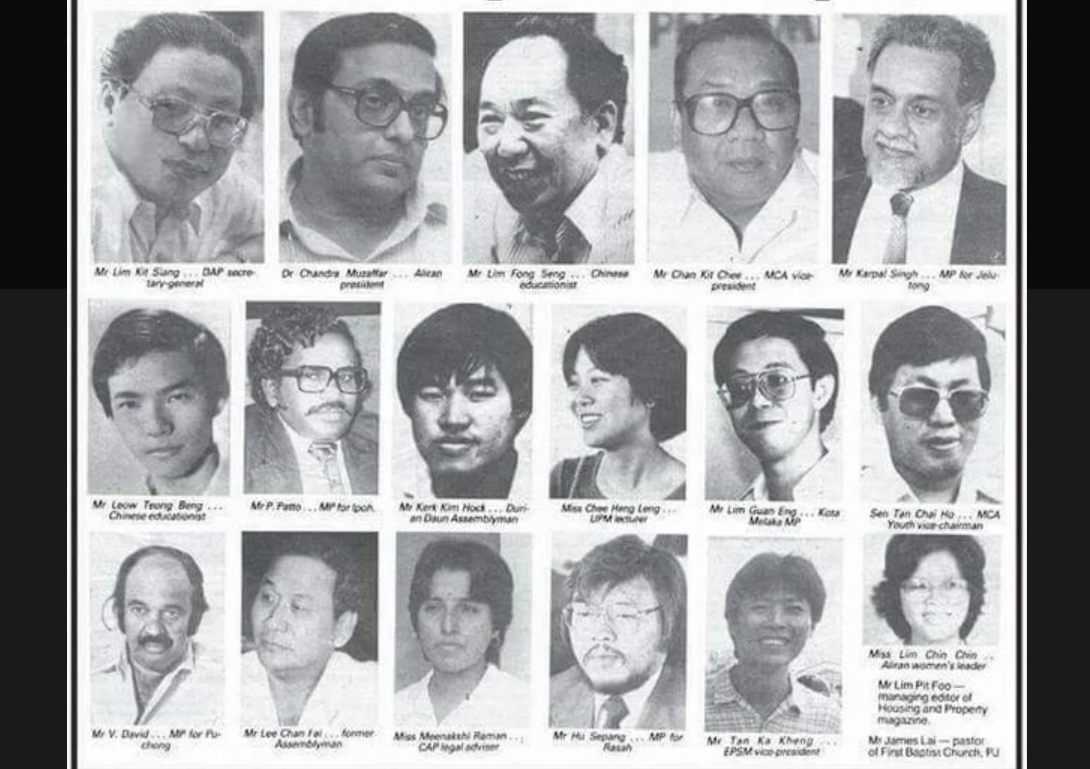MALAYSIA’S Abolish Detention Without Trial Day, celebrated annually on Oct 27, commemorates the draconian Operation Lalang (Ops Lalang) crackdown 35 years ago on Oct 27, 1987.
The crackdown saw about 106 persons arrested and detained under the Internal Security Act (ISA) 1960, the then-detention without trial (DWT) law, while the Home Ministry withdrew the printing and publishing licenses of The Star, Sin Chew Jit Poh and Watan, which were restored almost five months later on March 22, 1988.
The 106 detainees comprised human rights defenders, women rights defenders, politicians, academics and others. The list of politicians includes Lim Kit Siang (DAP), Lim Guan Eng (DAP), Muhamad Sabu (Amanah), Ibrahim Ali (Parti Bumiputera Perkasa Malaysia or Putra), Khaled Abu Samad (Amanah), the late P. Patto (DAP) and the late Karpal Singh (DAP).
PKR leader Datuk Seri Anwar Ibrahim was also twice a victim of the ISA, in 1974 and again in 1998.
What is disappointing is that many of these politicians, who today are still party leaders, seem to have abandoned their and their party’s commitment to abolish DWT laws.
How many Malaysian political parties are for the abolition of DWT laws? This must be made clear in the 15th General Election (GE15) manifestos of the various parties and coalitions.
The Malaysians Against Death Penalty and Torture (MADPET) reiterates the call for the abolition of all DWT laws, and states that all persons who are suspected of committing a crime shall be accorded the right to a fair trial, the ability to defend themselves and most importantly, be subject to the presumption of innocence until proven guilty, always.
All political parties and other independent candidates contesting in the upcoming GE15 must make a clear commitment to abolish DWT laws, and MADPET calls on Malaysian voters to not vote for parties or candidates that want to retain DWT laws.
Draconian feature
One draconian feature of Malaysia’s DWT laws is that persons arrested, detained or restricted under these laws have no right in law to challenge the reasons used by the police and the executive for such detentions. The Malaysian courts also do not have the right to review the reasons used, and this is unacceptable.
Section 15(1) of the Prevention of Crimes Act (POCA) 1949, for instance, states that: ‘There shall be no judicial review in any court of, and no court shall have or exercise any jurisdiction in respect of, any act done or decision made by the board in the exercise of its discretionary power in accordance with this Act, except in regard to any question on compliance with any procedural requirement in this Act governing such act or decision.’
Hence, no right to question the reason the law was used; just whether procedure was complied with.
The meaning of judicial review includes an application for any of the prerogative orders of judicial writs, prohibitions and judicial reviews, or for a declaration or an injunction, such as a writ of habeas corpus (protects against unlawful and indefinite imprisonment); and any other suit, action or other legal proceedings relating to or arising out of any act done or decision made by the Crimes Prevention Board in accordance with POCA.
This means that even an innocent person arrested, detained or restricted cannot even sue to be compensated for wrongful arrest, detention and/or restrictions to his freedoms.
This is a violation of Article 5(2) of the Federal Constitution, which states: “Where a complaint is made to a High Court or any judge thereof that a person is being unlawfully detained, the court shall inquire into the complaint and, unless satisfied that the detention is lawful, shall order him to be produced before the court and release him.”
DWT laws deny people this constitutional right when we cannot ask the court to review the reasons used for detention and/or restrictions.
Similar provisions appear in other DWT laws – which means that the administration or executive, without fear of judicial oversight and/or intervention, can do as it pleases against any persons in Malaysia, and that is what makes such laws draconian and why they ought to be abolished.
Remember: detentions can be for a period of two years maximum, with the ability to extend indefinitely for two years at a time.

It is the same with DWT law “restrictions” after being released from detention, which could include even meeting certain people, leaving home after some time, not being able to leave certain areas and maybe also not being able to contest in elections.
While at present, we may not have prominent personalities under these DWT laws, many in Malaysia may have been victimised by these laws, or are still victims of these laws, be it under detention or restrictions.
Sad state of affairs
It is a sad state of affairs that even political parties seem not concerned about the victims of these draconian DWT laws unless one of their leaders or members becomes a victim.
They should be concerned about all victims, who also are denied the right to a fair trial, and more so even the right to be compensated for the authorities’ wrongdoings.
Now the police, administration (including the home minister or Crimes Prevention Board) and/or the executive can simply arrest, detain and restrict anyone, even for some “fake” reason.
It means the police, minister and executive can do as it pleases, and there will be no remedy for the victim of these Government wrong-doings. For instance, the police, ministers or the Government can arrest, detain and restrict a person he believes may be suspected of having an affair with his wife or for some other “personal reasons” using existing DWT laws that cannot be exposed or challenged in court.
Without judicial review, the courts are barred from determining whether the reason is justified, true or totally false – hence the much-needed check and balance in a democracy are excluded when it comes to DWT laws.
Furthermore, individuals who commit murder or other crimes, where the law provides sentences on conviction, can also escape conviction and sentencing under the law; if arrested under DWT laws, they can walk free a few years later, making people angry to see such criminals “escape” the punishment provided by law.
A murderer, if tried and convicted, will be sentenced to death, and one wonders how many were not investigated, charged, tried and sentenced when the police/state decided to opt to use DWT laws instead.
There is also the possibility of the use of DWT laws to protect criminals from prosecution, trials, conviction and sentences provided by law. DWT laws could also be used against potential witnesses of crimes committed by politicians and others.
Wider scope of DWT laws today
Malaysia, under the then Barisan Nasional (BN) Government, repealed the ISA and the Emergency Ordinance 1969, but thereafter brought in a wider scope of DWT laws through POCA and a new detention without trial law, the Prevention of Terrorism Act 2015 (POTA).
Previously DWT laws were generally confined to matters of national security and arms-related gang activities, but today it has expanded. For example, under POCA, one new stated category is “individuals who belong to or consort with any group, body, gang or association of two or more persons who associate, for purposes which include the commission of offences under the Penal Code.”
So, if any crime is committed by two or more people – including corruption, murder, theft, rape, kidnapping or abuse of powers – a DWT law can be utilised.
The Government must disclose the number of persons under DWT laws, under detention and under restriction and for what Government-suspected reason.
How many people suspected of criminal conspiracy, corruption, murder, sexual offences, theft and other offences are under DWT laws?
Suspicion or belief in guilt by the police, ministers or the different DWT law boards is irrelevant as far as criminal offences are concerned as what is important at the end of the day is that the court is convinced of the alleged guilt of any criminal.
Hence, the continued use of DWT laws to avoid the rule of law requirements and the right to a fair trial indicates a bad Government.
How many are now under detention? How many are under restriction orders? Is it justified or is it simply an abuse of power where the innocent may end up victims with no right of redress?
Our calls to action are as follows:
- MADPET urges Malaysian voters to reject candidates and political parties during GE15 that do not commit to the abolition of DWT laws, in favour of restoring the rule of law, the right to a fair trial to all and adhering to the presumption of innocence until tried and convicted in a court.
- MADPET also would like to call on political parties/coalitions and candidates contesting in the upcoming GE15 to clearly state their position on DWT laws, which will also be a declaration of the principles and values they are committed to.
- Moreover, MADPET reiterates our call for the immediate repeal of all DWT laws, including POCA, POTA and the Dangerous Drugs (Special Preventive Measures) Act 1985.
- MADPET also calls for the immediate and unconditional release of all persons currently detained and/or restricted under DWT laws in Malaysia; if they are truly guilty, then they will be found guilty, convicted and sentenced by the Malaysian courts according to law. – Oct 29, 2022
Charles Hector is a lawyer and social rights advocate. He is also co-founder of non-Governmental organisation (NGO) Malaysians Against Death Penalty and Torture (MADPET).
The views expressed are solely of the author and do not necessarily reflect those of Focus Malaysia.









